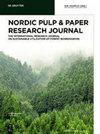社会林业中种植的硬木的有机酸分馏
IF 0.9
4区 农林科学
Q3 MATERIALS SCIENCE, PAPER & WOOD
引用次数: 0
摘要
Trema orientalis 和 Trewia nudiflora 是孟加拉国轮伐最快的树种(3-4 年一轮伐),在加济布尔地区的社会林业中进行了试验性种植。为了建立循环型生物经济,生物精炼是近期研究中被引用最多的课题。在建立生物精炼厂的过程中,两种树种都在大气条件下通过甲酸(FA)处理分馏成纸浆、木质素和半纤维素。经过碱性过氧化物漂白处理后的纸浆,东方鹅掌楸和裸花鹅掌楸的得率分别为 47.0 % 和 41.0 %,α-纤维素含量分别为 82.39 % 和 81.61 %,残留戊聚糖含量分别为 9.26 % 和 11.13 %。纸浆的白度分别为 84.5 % 和 85.0 %。漂白纸浆的冷碱提取使 α-纤维素分别增加到 92.36 % 和 91.29 %,适合用于生产纤维素衍生物。木质素通过加水从废液中分离出来。硬木中的 FA 木质素取代了苯酚-甲醛树脂制备过程中 20% 的苯酚,而不会牺牲剪切强度。木质素分离出的 FA 液主要含有戊糖,随后使用 0.1 % H2SO4 催化剂在 170 °C 温度下将其转化为糠醛,产量分别为 41.39 % 和 41.72 %。本文章由计算机程序翻译,如有差异,请以英文原文为准。
Organic acid fractionation of hardwoods planted in social forestry
求助全文
通过发布文献求助,成功后即可免费获取论文全文。
去求助
来源期刊

Nordic Pulp & Paper Research Journal
工程技术-材料科学:纸与木材
CiteScore
2.50
自引率
16.70%
发文量
62
审稿时长
1 months
期刊介绍:
Nordic Pulp & Paper Research Journal (NPPRJ) is a peer-reviewed, international scientific journal covering to-date science and technology research in the areas of wood-based biomass:
Pulp and paper: products and processes
Wood constituents: characterization and nanotechnologies
Bio-refining, recovery and energy issues
Utilization of side-streams from pulping processes
Novel fibre-based, sustainable and smart materials.
The editors and the publisher are committed to high quality standards and rapid handling of the peer review and publication processes.
Topics
Cutting-edge topics such as, but not limited to, the following:
Biorefining, energy issues
Wood fibre characterization and nanotechnology
Side-streams and new products from wood pulping processes
Mechanical pulping
Chemical pulping, recovery and bleaching
Paper technology
Paper chemistry and physics
Coating
Paper-ink-interactions
Recycling
Environmental issues.
 求助内容:
求助内容: 应助结果提醒方式:
应助结果提醒方式:


